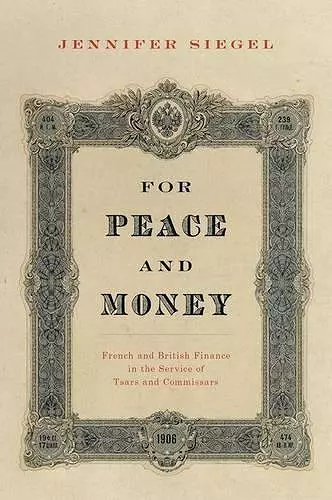For Peace and Money
French and British Finance in the Service of Tsars and Commissars
Format:Hardback
Publisher:Oxford University Press Inc
Published:15th Jan '15
Currently unavailable, and unfortunately no date known when it will be back
This hardback is available in another edition too:
- Paperback£42.49(9780190695767)

This book investigates how Russian debt to French and British bankers shaped diplomacy and foreign policy in the early 20th century.
In For Peace and Money, the intricate relationship between Russian financial debt and the diplomacy of France and Great Britain is explored during the late 19th and early 20th centuries. As Russia emerged as the leading international debtor in pre-World War I Europe, the financial ties with these nations shaped not only economic landscapes but also diplomatic alliances. The book delves into how loans from British and French bankers were essential for Russia's modernization efforts, including industrial advancements and military development. This financial dependency fostered a complex web of cooperation and understanding among the nations involved.
The narrative highlights the significance of the Franco-Russian alliance, illustrating how financial support from allies facilitated diplomatic negotiations and strengthened ties within the Triple Entente. The author emphasizes that the financial obligations imposed on Russia granted it a unique position, sometimes allowing it to influence the policies of its creditors. This dynamic illustrates the power shift that can occur within international relations, where a debtor nation can dictate terms to its lenders, reflecting the profound impact of financial interdependence on foreign policy.
Moreover, For Peace and Money examines the implications of these financial relationships on domestic society and foreign policy in all three countries. The book addresses key figures in finance and politics, such as Sergei Witte and the Rothschilds, and their roles in shaping policies that would have lasting effects. Ultimately, this work contributes to a deeper understanding of how economic factors intertwine with political decision-making, revealing the complexities of alliances in an era marked by both economic interconnectivity and geopolitical tensions.
This book's most important contribution is in uncovering the trove of documents in the archives of France, Great Britain, and, to a lesser extent, the United States. Russia's foreign loans and, in general, Russiaâs relationship with European financial institutions, have previously been the subjects of several important works, but none of them used such an array of archival materials in Europe. * Ekaterina Pravilova, The Russian Review *
Jennifer Siegel has written a gripping and entirely convincing narrative of the financial struggle that preceded the outbreak of war in 1914, and a fine account of the way in which a weak power used debt to manipulate the diplomacy of the stronger powers. * Harold James, Princeton University *
This is a fascinating and original work on the role of British and French finance in their relations with late-imperial but also early-Soviet Russia. Both diplomatic and financial history are unfashionable among contemporary Western historians: all the more refreshing therefore to read a truly path-breaking work dedicated to this topic. Professor Siegel brings to this study not just much research in a range of Russian and Western archives but also insights derived from her own first-hand experience of the financial world. Anyone interested in not just Russian history but also international relations in the era of the First World War should read this book. * Dominic Lieven, author of Towards the Flame: The End of Tsarist Russia *
Jennifer Siegel's superbly researched and powerfully argued monograph provides an exciting new perspective on the era of the First World War. For Peace and Money illuminates the crucial role played by financial diplomacy in the evolution of the Triple Entente before 1914, in the political dynamics of the Allied cause during the Great War, and in the international effort to rebuild European politics and society after that conflict. Siegel's highly original analysis challenges us to rethink the politics of indebtedness among Great Powers. The result is an ambitious reinterpretation of international relations during this period of profound upheaval and systemic change. * Peter Jackson, author of Beyond the Balance of Power: France and the Politics of National Security in the Era of the First World War *
In this important study, Siegel documents the role played by French and British lenders in underwriting Russia's transformation into a modern industrial and military power before World War I and the allies' financial support of the empire's participation in that conflict. Written in accessible prose and supported by impressive evidence from all three countries, this study reminds readers of the central role of finance in international relations, while showing them that its role is often more ambiguous than they might expect. * David McDonald, University of Wisconsin-Madison *
ISBN: 9780199387816
Dimensions: 177mm x 238mm x 25mm
Weight: 558g
328 pages